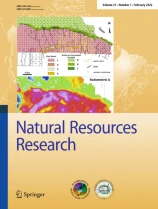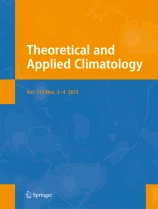E-Journal Internasional untuk Program Studi Pendidikan Geografi
| No | Thumbnail | Sources | Publisher | ISSN | Main Topics | Status |
|---|---|---|---|---|---|---|
| 1 |  | Landslides: Journal of the International Consortium on Landslides | Springer Nature | 1612-5118 | Landslide dynamics, mechanisms and processes, Landslide risk evaluation: hazard assessment, hazard mapping, and vulnerability assessment, Geological, Geotechnical, Hydrological and Geophysical modeling, Effects of meteorological, hydrological and global climatic change factors, Monitoring including remote sensing and other non-invasive systems, New technology, expert and intelligent systems, Application of GIS techniques, Rock slides, rock falls, debris flows, earth flows, and lateral spreads, Large-scale landslides, lahars and pyroclastic flows in volcanic zones, Marine and reservoir related landslides, Landslide related tsunamis and seiches, Landslide disasters in urban areas and along critical infrastructure, Landslides and natural resources, Land development and land-use practices, Landslide remedial measures / prevention works, Temporal and spatial prediction of landslides, Early warning and evacuation, Global landslide database | |
| 2 |  | Natural Resources Research | Springer Nature | 1573-8981 | geoscientific data or analyses to assess, test, or compare resource-related aspects. NRR covers a wide variety of resources including minerals, coal, hydrocarbon, geothermal, water, and vegetation | |
| 3 |  | Climate Dynamics | Springer Nature | 1432-0894 | paleoclimatic, diagnostic, analytical or numerical modeling research on the structure and behavior of the atmosphere, oceans, cryosphere, biomass and land surface as interacting components of the dynamics of global climate are especially welcome, as are contributions focused on selected aspects of climate dynamics on particular scales of space or time | |
| 4 |  | Natural Hazards | Springer Nature | 1573-0840 | general, atmospheric, climatological, oceanographic, storm surges, tsunamis, floods, snow, avalanches, landslides, erosion, earthquakes, volcanoes, man-made, technological, and risk assessment. The interactions between these hazards and society are also addressed in the journal and include risk governance, disaster response and preventive actions such as spatial planning and remedial measures | |
| 5 |  | Theoretical and Applied Climatology | Springer Nature | 1434-4483 | climate modelling with all trace constituents of the atmosphere and associated feedbacks, climatic change and climate projections, methods of climate related modelling including artificial intelligence (deep learning, machine learning), micro-, meso- and global climate, climate services, communication, adaptation and mitigation of climate change, applied meteorology, biometeorology, building meteorology and technical meteorology, eco-climatology with its complex interactions with ecosystems, including aspects of self-organization, stability and ecosystem services, like carbon sequestration or agricultural and forestry products, meteorological measurements, including techniques of remote sensing, network analysis and geo-statistics of climate data | |
| 6 |  | Environmental Earth Sciences | Springer Nature | 1866-6299 | Groundwater systems: the quality, quantity and sustainability of groundwater, Deep sub-surface reservoirs: geothermal energy and nuclear waste disposal, Geo-hazards: man-made or naturally occurring such as landslide, Geological and water resources engineering: to reduce ecosystem and human health risks and to prolong sustained access to natural resources, Environmental impact assessment from a geological perspective: data- and model-driven risk analysis during extraction of fossil fuels, minerals and ores including those for renewable energy production, and in the disposal of hazardous materials and solid waste, Research tools: geophysical, geochemical and geobiological observational tools, geostatistical and geospatial methods, data assimilation and modeling methods for sub-surface environment and solid phase investigations, artificial intelligence-based characterization of data and processes | |
| 7 |  | GPS Solutions | Springer Nature | 1521-1886 | global navigation satellite systems (GNSS) such as GPS, GLONASS, Galileo, BeiDou, local systems, and augmentations. Novel, innovative, or highly demanding uses are of prime interest. Areas of application include: aviation, surveying and mapping, forestry and agriculture, maritime and waterway navigation, public transportation, time and frequency comparisons and dissemination, space and satellite operations, law enforcement and public safety, communications, meteorology and atmospheric science, geosciences, monitoring global change, technology and engineering, GIS, geodesy, and others. | |
| 8 |  | Bulletin of Earthquake Engineering | Springer Nature | 1573-1456 | mitigation of earthquake risks; Earthquake source mechanism and strong motion characterization and their use for engineering applications; Response and analysis of geological and geotechnical site conditions under earthquake excitations; Cyclic behaviour of soils; Response, analysis and design of earth structures and foundations under seismic conditions; Zonation and microzonation methodologies; Earthquake scenarios and vulnerability assessments; Earthquake codes and improvements; Response, analysis and design of all man-made structures under seismic conditions; Performance based seismic evaluation and design; Repair and strengthening; Damage assessments; Transportation and lifeline systems in seismic environments; Seismic response of historical monuments and structures; Seismic isolation, passive energy dissipation, active control of vibrations and other modern technologies for energy dissipation; Earthquake risk mitigation policies and methodologies. | |
| 9 |  | Geo-Marine Letters | Springer Nature | 1432-1157 | structural geology, including plate tectonics of recent active and passive margins, sea-bed morphology, physiography and morphodynamics, sediment transport, depositional processes and sedimentary facies analysis, stratigraphy, basin analysis and paleoenvironmental reconstruction, sea-level history, paleoproductivity, gas hydrates, salt domes and brines, sediment-water interaction and organism-sediment relationships, geochemical tracers, stable isotopes and authigenic mineral formation, geotechnical properties and application of new geo-marine techniques, and more. | |
| 10 |  | Aquatic Geochemistry | Springer Nature | 1573-1421 | geochemistry of natural waters and their interactions with rocks and minerals under near Earth-surface conditions | |
| 11 |  | Pure and Applied Geophysics | Springer Nature | 1420-9136 | Geofisica pura e applicata", publishes original scientific contributions in the fields of solid Earth, atmospheric and oceanic sciences. Regular and special issues feature thought-provoking reports on active areas of current research and state-of-the-art surveys | |
| 12 |  | Bulletin of Engineering Geology and the Environment | Springer Nature | 1435-9537 | the applications/implications of the geomorphology, structural geology, and hydrogeological conditions of geological formations; the characterisation of the mineralogical, physico-geomechanical, chemical and hydraulic properties of all earth materials involved in construction, resource recovery and environmental change; the assessment of the mechanical and hydrological behaviour of soil and rock masses; the prediction of changes to the above properties with time; the determination of the parameters to be considered in the stability analysis of engineering works and earth masses; | |
| 13 |  | Ocean Dynamics | Springer Nature | 1616-7228 | Theoretical oceanography (new theoretical concepts that further system understanding with a strong view to applicability for operational or monitoring purposes), Computational oceanography (all aspects of ocean modeling and data analysis), Observational oceanography (new techniques or systematic approaches in measuring oceanic variables, including all aspects of monitoring the state of the ocean), Articles with an interdisciplinary character that encompass research in the fields of biological, chemical and physical oceanography are especially encouraged. | |
| 14 |  | International Journal of Earth Sciences | Springer Nature | 1437-3262 | Dynamics of the lithosphere, Tectonics and volcanology, Sedimentology, Evolution of life, Marine and continental ecosystems, Global dynamics of physicochemical cycles, Mineral deposits and hydrocarbons, Surface processes. | |
| 15 |  | Geoscience Letters | Springer Nature | 2196-4092 | Atmospheric Sciences, Biogeosciences, Hydrological Sciences, Interdisciplinary Geosciences, Ocean Sciences, Planetary Sciences, Solar and Terrestrial Sciences, and Solid Earth Sciences | |
| 16 |  | Journal of Petroleum Exploration and Production Technology | Springer Nature | 2190-0566 | Reservoir characterization and modeling, Unconventional oil and gas reservoirs, Geophysics: Acquisition and near surface, Geophysics Modeling and Imaging, Geophysics: Interpretation, Geophysics: Processing, Production Engineering, Formation Evaluation, Reservoir Management, Petroleum Geology, Enhanced Recovery, Geomechanics, Drilling, Completions | |
| 17 |  | Intelligent Marine Technology and Systems | Springer Nature | 2948-1953 | Marine artificial intelligence and Marine big data: including ocean phenomenon recognition, ocean data super resolution, ocean phenomenon prediction, ocean multimodal data processing, underwater pattern recognition, big data collection and transmission, ocean big data storage and management, ocean big data information mining, ocean big data visualization and analysis, etc. Marine environment perception: (1) Physical environment perception, including underwater acoustics, underwater optics, marine remote sensing, marine internet of things; (2) Biological environment perception: including using all kinds of intelligent technology and systems to understand biological oceanography, interactions between marine organisms, marine ecosystem dynamics, marine biotelemetry, etc. Marine instruments and engineering: including marine exploration equipment, ocean energy utilization, deep-sea operation instruments, underwater robots, and other instruments and application technologies related to marine resources exploitation and marine environment governance, etc. |









